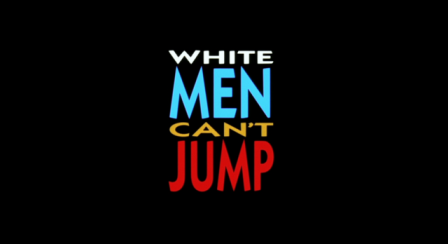There’s a lot of sass in filmmaker Calmatic’s “White Men Can’t Jump,” but it’s not the nice kind. It’s this toxic hubris that weakens him, turning a masterpiece into a repetitive joke and turning his picture into a dull torture. You never know what he’s trying to achieve or why he believes this narrative is ripe for repeating (a flaw shared by his “House Party” adaptation, too). The picture is as bland as it is cheap, and as unsatisfying as any cash grab for a well-known property could be.
“White Men Can’t Jump” by writer/director Ron Shelton has a subtle touch that this updated version severely lacked. It reversed prejudices to expose additional clichés floating on the surface through Billy Doyle (Woody Harrelson), a white former collegiate basketball hero now burdened with a massive gambling debt who travels across the nation to evade his creditors. Travelling with his fiancée Gloria (Rosie Perez), he hustles pick-up basketball games, such as the one played by streetballer Sidney Deane (Wesley Snipes), to get some cash since Black people frequently underestimate white people’s basketball skill. Billy and Sidney quickly build a hard-won understanding, eventually fighting in a two-man competition that exposes each man’s real nature.
It’s a clever, adaptable narrative with current relevance. Unless you’re Kenya Barris and Doug Hall, screenwriters. Calmatic’s script, which regards the previous picture as outmoded (more on that later), undoes much of Shelton’s deft work. Jeremy (a monotonous Jack Harlow) is a smarmy personal trainer who carries an NPR backpack and sells detoxifying, organic juice to his basketball customers. He was once a collegiate basketball star, but two torn ACLs prevented him from reaching his full potential. He intends to one day earn enough money to retool his ligaments using stem cells so that he may compete in the G-league. Jeremy, like Billy, uses trash-talking to get Black players into games for money. Harlow’s delivery is awkward and artificial, with little bite and much less conviction.
Kamal Allen (Sinqua Walls) is his main victim and the only one we see. Kamal is portrayed as an enigma. In the first scene of the film, a young Kamal and his father Benji (Lance Reddick) are celebrating his signing with a nationally broadcast interview. So, what happened to the young guy that went from NBA potential to playing in a simple gym? In the first several minutes, we only see a close-up of Benji’s hand quivering as he grips his son’s arm. After ten years, the easily annoyed Kamal is an easy target for Jeremy, who refers to Kamal as a “wannabe [James] Harden.” The sentence is one of several not-so-subtle efforts to rekindle Shelton’s script’s sociopolitical spark.
Aside from the star-studded cast’s bubbling charisma, what ultimately made the original so memorable was its incisive indictment of stereotypes: Of course, there’s the suggestive title. It’s a 180-degree turn from the first portrayal of Black people being racially insensitive to whites.
Shelton, on the other hand, spends the film gently reworking the phrase: Harrelson can’t jump (though he could if he practised), but his embryonic jumping ability is a metaphor for his lack of drive. While he chastises Snipes for showboating, hotdogging, and not playing fundamental basketball—a slew of dog whistles neatly woven into the stereotype of Black people as jobless thugs—it is Snipes who is the loving father working multiple jobs to support his family while Harrelson gambles away his and Perez’s money.
While a review should not be based exclusively on how a remake compares to its original, Calmatic is pushing spectators to perceive his version as the greater offering: Every character makes a remark about how out of date the last picture was. The video downplays the prejudices associated with Black athletes and argues that no one believes white guys can’t leap anymore. The film wears ugly post-racial clothing in the interactions between Jeremy and Kamal, instead giving half-hearted but on-the-nose humour about gentrification, reparations, and clout chasing. The film cannot imagine anything like the Angel Reese incident, in which a Black woman is accused of bad sportsmanship against a white opponent in the women’s NCAA championship, occurring. It also fails to recognise the significance of Rosie Perez’s role in the prior film. Rather, she is recast as Tatiana, a hairdresser with little screen time or narrative weight.
As seen in Kamal’s relationship with his father and the anger issues that stem from his fear of disappointing him, and as represented in his loving relationship with his daughter and wife (an underutilised Teyana Taylor), there is some shallow attempt at navigating Black masculinity and the need for self-care in the face of Black vulnerability. However, the picture is too preoccupied with attempting to be a sleepy comedy to carry off solid character development.
It doesn’t help that Calmatic has the visual narrative skills to do so as well. The basketball sequences, although smooth and aerodynamic, with the camera swooping across the games with accuracy don’t contribute to the tale. What are the subplots in these pickup games? It’s a question that has gone mostly unaddressed, making these scrimmages seem stale and lack rhythm (choppy editing doesn’t help either).
There are so many loose ends at the end, a final two-on-two championship game resulting in a considerably happier—and less honest—ending than the last film, that there is little suspense or reason for joy. By the conclusion of “White Men Can’t Jump,” there is only astonished resignation for how close to the mundane this picture maintains.
More in Entertainment: https://buzzing.today/entertainment/
Photo Credits: https://commons.wikimedia.org/
